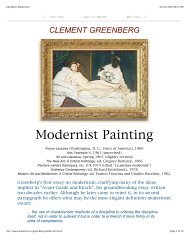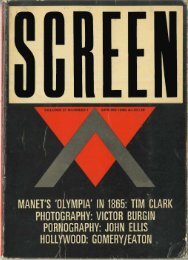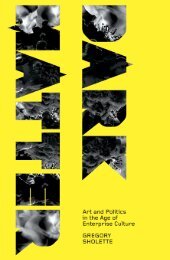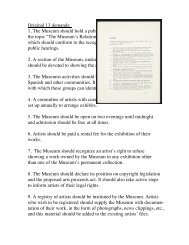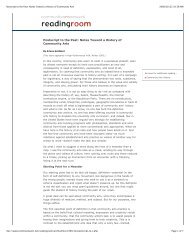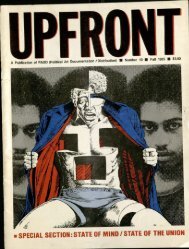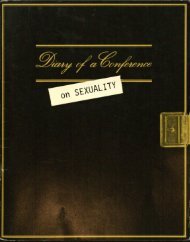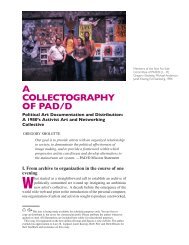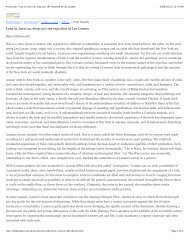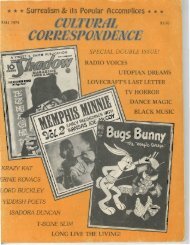The New Spirit of Capitalism - Dark Matter Archives
The New Spirit of Capitalism - Dark Matter Archives
The New Spirit of Capitalism - Dark Matter Archives
You also want an ePaper? Increase the reach of your titles
YUMPU automatically turns print PDFs into web optimized ePapers that Google loves.
23Remains the thorny problem <strong>of</strong> how a firm's overall direction is to be managed - anissue with which the authors in our sample are still grappling. <strong>The</strong> existence <strong>of</strong> networks doesnot mean that firms no longer exist as separate entities (i.e., that they have been diluted by thenetwork(s) within which they work). A firm’s senior managers will still devise thecompetition strategies that allow it to do battle with other multinationals (on those marketswhere they do not collaborate). Moreover, the self-organised and creative individuals whoare henceforth responsible for a firm's performance still need to be directed. This directionwill be the work <strong>of</strong> few persons – managers who in any event should be distinguished fromearlier, "hierarchical chiefs" Now we have leaders with vision (c.f., Extracts 5,6). Thanks toa shared sense-making in which all participate (the aforementioned "vision"), everyone knowswhat s/he has to do without being ordered to do so. A strong management direction is clearlyfelt without there being any need to issue orders, and personnel can continue to be selforganising.<strong>The</strong> 1990s authors write in terms <strong>of</strong> "managers" as opposed to "cadres", highlightingthose human qualities that have adapted best to capitalism's current requirements, and to theenvironment <strong>of</strong> "uncertainty" and "complexity" that firms have been plunged into. Managersare neither seeking to command, nor to order people around - and employees are not waitingfor orders before acting. Everyone has understood that such roles are out <strong>of</strong> date. Managershave become "team leaders", "catalysts", "visionaries", "coaches", and "drivers". <strong>The</strong> "driver"(N.T., "donneur de souffle"in the French, literally “the person who provides the breath”) is acharacter that was invented by Hervé Sérieyx. Like other 1990s authors who lacked theappropriate vocabulary to describe the new corporate hero, Sérieyx was forced to make up hisown expressions. Rosabeth Moss Kanter talks about "corporate athletes", Meryem Le Sagetabout "intuitive managers" and Lionel Bellenger about "pros" (7). Other terms such as coach,team leader or "midwife" are used by several different authors.Extracts:5. Vision, a commodity that creates enthusiasm, is not just a mission - it is also a powerful magnet. Like allgreat challenges, vision awakens collective capacities. (Crozier, Sérieyx, eds., 1994).6. <strong>The</strong> leader is a person who has been given this role by the group - the person with whom each individual inthe group consciously or subconsciously identifies. Thanks to his/her influence, visionary artistry andorientations, the leader creates a current that spurs people into transcending themselves; into trusting others;and into showing initiative (Cruellas, 1993).7. We don't even possess an appropriate vocabulary for discussing these new types <strong>of</strong> relationships. <strong>The</strong> terms"superiors" and "subordinates" hardly seem precise enough. Even words like "boss" and "employees" implyconcepts <strong>of</strong> control and/or rights which managers do not always actually have. (Moss Kanter, 1991)With the decline in nearby hierarchical control, there have been increasing referencesin management (and indeed in micro-economic) literature to the idea <strong>of</strong> trust. Trust is thatwhich unites team members amongst themselves; a firm with its leader; a coach with theperson s/he is helping; or partners within an alliance. Trust presupposes self-control – itfocuses on the existence <strong>of</strong> secure relationships in situations that are otherwise based onnothing more concrete than words and/or moral contracts. Indeed, trust possesses a moraldimension, whereas control by a third party is little more than the expression <strong>of</strong> a relationshipthat is based on the domination <strong>of</strong> one party by another (8).Extract:8. <strong>The</strong> balance <strong>of</strong> power is no longer a salient issue when the main objective is the creation <strong>of</strong> a sense <strong>of</strong>belonging, a feeling <strong>of</strong> satisfaction with and trust in one another (Aktouf, 1989).



